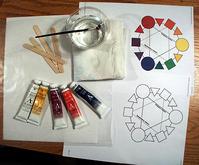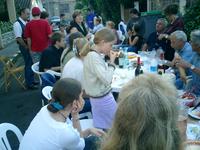|
This is my dynamic, frequently updated homepage. This is a NewsLog, also known as a WebLog or Blog.
Everything is evolving, so don't assume too much.
People to watch:
Adina Levin
Andrius Kulikauskas
Britt Blaser
Catherine Austin Fitts
Chris Corrigan
Clay Shirky
Dan Gillmor
Dave Pollard
David Allen
David Weinberger
Dewayne Mikkelson
Dina Mehta
Doc Searls
Elisabet Sahtouris
Elizabeth Lawley
Euan Semple
Florian Brody
Frank Patrick
Gen Kenai
George Dafermos
George Por
Graham Hancock
Greg Elin
Hazel Henderson
Heiner Benking
Inspector Lohman
Jean Houston
Jerry Michalski
Jim McGee
Jim Moore
John Abbe
John Perry Barlow
John Robb
Joi Ito
Jon Husband
Jon Lebkowsky
Jon Udell
Jonathan Peterson
Judith Meskill
Julian Elvé
Julie Solheim
Kevin Marks
Lawrence Lessig
Leif Smith
Letecia Layson
Lilia Efimova
Lisa Rein
Marc Canter
Mark Oeltjenbruns
Mark Pilgrim
Mark Woods
Martin Dugage
Martin Roell
Mary Forest
Matt Mower
Max Sandor
Michael Fagan
Mike Owens
Mikel Maron
Mitch Kapor
Mitch Ratcliffe
Nathalie dArbeloff
Netron
Noam Chomsky
Paul Hughes
Peter Kaminski
Phil Wolff
Philippe Beaudoin
Ray Ozzie
Raymond Powers
Rebecca Blood
Roger Eaton
Roland Tanglao
Ross Mayfield
Scott Lemon
Sebastian Fiedler
Sebastien Paquet
Skip Lancaster
Spike Hall
Steven Johnson
Stuart Henshall
Thomas Burg
Thomas Madsen-Mygdal
Thomas Nicholls
Timothy Wilken
Todd Suomela
Tom Atlee
Tom Munnecke
Tom Tomorrow
Ton Zijlstra
Lionel Bruel
Loic Le Meur
Nancy White
Mark Frazier
Merlin Silk
Robert Paterson
Colby Stuart
Nova Spivack
Dan Brickley
Ariane Kiss
Vanessa Miemis
Bernd Nurnberger
Sites to watch:
Edge
Junto
Absara
Rhizome
Nanodot
HeadMap
Openworld
FutureHi
Imaginify
Do No Harm
BoingBoing
Smart Mobs
Webcamorama
MetaFilter
NotThisBody
Disinfopedia
YES Magazine
Collective Web
WorldChanging
Disinformation
Escape Velocity
Space Collective
Friendly Favors
Emergent by Design
Independent Media
Global Ideas Bank
Forbidden Science
Greater Democracy
ThoughtsOnThinking
Disclosure Project
Explorers Foundation
Manufacturing Dissent
Collective Intelligence
Action without borders
Free Expression Network
Co-intelligence Institute
Electronic Frontier Foundation
French:
Emmanuelle
Manur
Elanceur
Loeil de Mouche
IokanaaN
Blog d'Or
Le Petit Calepin
GeeBlog
Absara
Guillaume Beuvelot
Ming Chau
Serge Levan
Jean Michel Billaut
C'est pas Mécanique

I live in Toulouse, France where the time now is:
01:06
Unique Readers:

Primarily
Public Domain
Everything I've written here is dedicated to the
Public Domain.

The quotes from other people's writings, and the pictures used might or might not be copyrighted, but are considered fair use. Thus, overall, this weblog could best be described as being:
Primarily Public Domain. |
Syndication:
 ![Validate my RSS feed [Valid RSS]](http://www.newciv.org/pic/valid-rss.png)
|
| Thursday, June 17, 2004 |  |
|
|
|
Via Wealth Bondage, here's this from the Cato Institute: An ownership society is a society that values responsibility, liberty, and property. An ownership society empowers individuals by freeing them from dependence on government handouts and making them owners instead, in control of their own lives and destinies. In the ownership society, patients control their own health care, parents control their own children's education, and workers control their retirement savings. Yes, too bad you don't qualify. What a chilling bunch of crappy double-speak. What it means is: This is why you have no healthcare insurance, why the public schools are enormously underfunded, and why the social security fund has been depleted years ago. It's because you're supposed to do all of those things yourself. Because that's what it means to be a free person: that the government isn't doing anything for you. If you pay for everything yourself, you're in control. I guess that's a particularly American illusion. Or a conservative political ideology, or whatever we'll call it. Pretty much from the same people who've increased the U.S. taxation and national debt and corporate welfare, orders of magnitude more than any of their democratic counterparts who were actually expected to do so. A couple of Republican presidents have succeeded more than any communist revolution would have. The reality of an ownership society unfortunately became that for 99% of the population, somebody else than you owns you and the output of your creativity and productivity.
If it were for real, it would be nice of course. I.e. that people can be in control of their own lives, and own what they do. And be responsible and free. But that requires real ownership and real freedom. Not just that the government takes half your money and doesn't give it back, and you're free to have a mortgage and buy a big car on credit, and that you just barely can afford your health insurance. No, rather real freedom and real democracy and ability to live by your own devices. Owning your own life. Co-owning society. Would be a nice idea.
[ Politics | 2004-06-17 15:37 | | PermaLink ] More >
|
|
| Monday, June 14, 2004 |  |
|
|
|

As an art and business project, some folks at a conference in Berlin created a dotcom company in 24 hours. Including a kick-off party, planning, nightly coding, various milestones, release, and a public IPO. I.e. they put the company for sale on ebay. There's still time to go and bid.
Well, it is in part performance art, but not altogether crazy. Why shouldn't it be possible? Getting the right people together, with a good deal of creativity, some intensive work, good promotion, no big reason it shouldn't happen really quickly. It is not really the time that matters, but whether they can come up with a unique product niche and selling proposition. I can't quite see what their product ended up being, and it is somewhat doubtful if it is useful. But the best of luck. The company is up to only $1225, so if it is anything at all, there should be possibility for some profit there. Now if that turned into a billion dollar company, that would be really fun.
[ Culture | 2004-06-14 16:32 | | PermaLink ] More >
|
|
|
|
Denham Grey talks about patterns in the field of knowledge management:Patterns when applied with energy, adequate social negotiation, critique and sensitivity, represent meta-best practices. They capture the best of the best. An assembly of patterns gives rise to a super language, a high level efficient and very rich discourse. Patterns are part representation , part knowledge artifact (thing), and part compact solutions. Patterns may represent strong reification, they carry meaning and an investment of energy (cathexis). They make for interesting objects and the pattern community displays very useful dynamics. He links to some good pattern resources too. Patterns are cool.
[ Knowledge | 2004-06-14 17:27 | 0 comments | PermaLink ]
|
|
|
|
 Adina Levin, part of the SocialText team, talks about Chris Alexander's patterns that relate to levels of intimacy, and how that might apply to social software: Adina Levin, part of the SocialText team, talks about Chris Alexander's patterns that relate to levels of intimacy, and how that might apply to social software:Alexander writes about an "intimacy gradient". There are some areas in a house that are public -- the front porch; areas that are indoors and public -- the living room; and areas that are indoors and more private -- bedrooms and bathrooms.
The design opportunity is to create livable, workable, more-public and more-private spaces, using a "social software method" that focuses on helping people connect and collaborate with people in the least restrictive, most appropriately trusting way.
This is a different design philosophy than the traditional methods for setting levels of privacy. The underlying traditional assumption is that information should be available, and users should have privileges, on a "need to know basis." Individuals should have as little information and as few privileges as they need to do their jobs.
The goal of a tool for group work is to be able to restrict access with as much control as possible. Content and privileges should be controllable at a highly granular level. A work process should be clearly defined, to determine what users should have access to what information, and a given stage of a process.
This methods depend on a highly-structured, formal process. Analysts and administrators need to carefully define the types of information, to parcel out privileges, and to be able to monitor information access. So, the alternative might be to not have complicated and forced privacy and sharing settings, but rather to structure things so that the right things naturally tend to happen in the right places, and the right things tend to be seen by the right people? I'm all for it.
I've often thought about it, for that matter. A problem is that the hyperlinking nature of the web short-circuits a lot of what works in architecture, which is Chris Alexander's field.
In a house, different sorts of activities naturally happen in different places. That is in part based on how deep into the house those places are. The entrance hallway is easily accessible and has a number of doors. Good place to say hello and share general messages, but it is superficial. One can go further into the house, into the living room, which is more sheltered, and have a deeper conversation there. The bedroom is a step further, and feels more intimate, as it takes several steps to get there. Now, there might not be anything that physically hinders some guest from storming straight into the bedroom without being invited there, and start looking through the closets. But everybody will notice that it doesn't feel right, and will deal with it somehow. And it rarely happens in normal homes. You start in the entry hall, and if you sort of pass that test, somebody will take you further into the house, and for most people it doesn't feel right to overstep the norms for how one behaves in somebody's house.
But a website tends to have the equivalent of links that say "entry hall", "living room", "kitchen", "bedroom", all appearing at the same level. And with Google's help, there will also be direct links to "bedroom closet" and "the reading material next to my bed". Which sort of kills the gradients of intimacy.
The problem is that parts of the net aren't working as much as *spaces* as we think they might have. It is really just a lot of information. And we'd like direct access to information, with deep linking, without anything annoying standing in the way, like having to register.
Doesn't mean we can't re-invent *spaces* as a parallel effort. To get to certain spaces, to hang out with certain people, it is acceptable enough if I need to jump through some hoops to get there. I don't know how to design those spaces so it feels natural, but that is potentially solvable.
As long as a certain chat room or wiki page is accessible directly with a deep link, it is going to be very hard to make it feel more intimate than any other place I can reach with similar ease. So a hierarchical structure of links doesn't do it. On the web you can't force people to accept your hierarchy if it is all just links.
One thought is that the spaces that need to be more intimate should not have permanent locations, but rather a dynamic location. E.g. if I wanted a certain type of conversation with certain people, I might have to go through those people and get their agreement that they're up for such an interaction with me today. Rather than me linking directly into it. Even if we had a very similar conversation yesterday.
[ Patterns | 2004-06-14 18:29 | | PermaLink ] More >
|
|
| Sunday, June 13, 2004 |  |
|
|
|
 That mostly means birthday in French. So, we had Nadia's five year birthday party yesterday. Went very well. We were a bit nervous about that. You know, we're still a bit unsure about some French customs, and whether things work the same or differently than in the States. How do we invite people? Do the parents drop off their kids, or do they stay? Do we arrange games? Do we give them a "loot bag" with little trinkets? Luckily, things work pretty much the same. Except for that it maybe is a bit harder to manage a gang of little French girls. French kids seem surprisingly assertive. They generally know what they want and what they don't want. And don't hold themselves back asking inquisitive questions. I've more than once been cornered by some little kid in the playground who had a long list of things that needed explanation. Where I come from, and why, and why my daughter spoke English, and what I think about this or that. Anyway, by now my daughter blends in much better than I do. She has her clique of pals from school, and blabbers away in French with little problem. That mostly means birthday in French. So, we had Nadia's five year birthday party yesterday. Went very well. We were a bit nervous about that. You know, we're still a bit unsure about some French customs, and whether things work the same or differently than in the States. How do we invite people? Do the parents drop off their kids, or do they stay? Do we arrange games? Do we give them a "loot bag" with little trinkets? Luckily, things work pretty much the same. Except for that it maybe is a bit harder to manage a gang of little French girls. French kids seem surprisingly assertive. They generally know what they want and what they don't want. And don't hold themselves back asking inquisitive questions. I've more than once been cornered by some little kid in the playground who had a long list of things that needed explanation. Where I come from, and why, and why my daughter spoke English, and what I think about this or that. Anyway, by now my daughter blends in much better than I do. She has her clique of pals from school, and blabbers away in French with little problem.
[ Diary | 2004-06-13 06:36 | | PermaLink ] More >
|
|
| Saturday, June 12, 2004 |  |
|
|
|
 There are several kinds of magic. There's of course what a stage magician does to fool the audience into partially believing he's doing something impossible, and entertaining them in the process. Then there's the magic of wonderous moments, where the universe moves and reveals its mysteries in surprising and wonderful ways. Communing with nature, experiencing an artistic performance, or being part of a synchronistic event where things just come together in the exactly right, but completely unexpected way. There are several kinds of magic. There's of course what a stage magician does to fool the audience into partially believing he's doing something impossible, and entertaining them in the process. Then there's the magic of wonderous moments, where the universe moves and reveals its mysteries in surprising and wonderful ways. Communing with nature, experiencing an artistic performance, or being part of a synchronistic event where things just come together in the exactly right, but completely unexpected way.
And then there's the deliberate practice of Magick, usually spelled with a 'k' at the end. It is something that is widely misunderstood, and very often shrouded in or lost in a lot of mysterious mumbo-jumbo symbolism that might or might not make sense to anybody. In the past that has been in part because masters of magick wanted to confuse and mislead the competition, or at least make sure that only the most dedicated and clever students would do the necessary work to figure out what it is. As its practice requires significant dedication and focused work. Many principles of the universe are involved, but mostly it adds up to something that is largely a discipline of the mind. One could say that it is:To train the mind to move with the maximum speed and energy, with the utmost possible accuracy in the chosen direction, and with the minimum of disturbance or friction. That is from Aleister Crowley. He managed, more than just about anyone, to explain magick in clear language and reveal most of its secrets. Strangely, he also became a very misunderstood and hated man. Maybe not so strange - a lot of people felt threatened by what he had to teach and what he stood for, and he didn't hesitate in being as provocative as he could when he had a chance.
Many of the things to understand are in rather paradoxical forms. Thus the above aim goes hand in hand with the aim:To stop the mind altogether. Which is what meditation or yoga or many other practices are about. It is quite logical, really. Most people's minds are full of a lot of uncontrolled, undisciplined junk, running on automatic. To focus in any effective manner on anything, one needs to be able to stop the flurry of random data. The better, the more completely one can do that, the more well poised one is for subsequent acts of great clarity and focus.
One of Crowley's basic tenets, which, again, is largely misunderstood and misquoted is:Do what thou wilt shall be the whole of the Law.
Love is the law, love under will. Unscrupulous people usually quote just the first line, and misinterpret it to give a license to do whatever the hell one wants, no matter it does to anybody else. And, well, there are unfortunately too many people who live by such a principle. That's not what's meant here. The Will referred to is closer to what some people would call "Divine Will". But not in the fundamentalist understanding where, again, it is an excuse for doing things there is no excuse for. Rather, the most integruous and constructive thing is the thing to do. The most honest and authentic thing to do. The most loving. Not a human whim, but a connection with the universal mind. In a state of freedom. Hard to explain in words, as one has misunderstood it the moment one just takes the words literally. Anyway, here are some more excerpted basics on magick from Crowley, The Beast, 666 himself: Definition: Magick is the Science and Art of causing Change to occur in conformity with Will.
Postulate: ANY required Change may be effected by application of the proper kind and degree of Force in the proper manner through the proper medium to the proper object.
Theorems:
Every intentional act is a Magical Act.
Every successful act has conformed to the postulate.
Every failure proves that one or more requirements of the postulate have not been fulfilled.
The first requisite for causing any change is thorough qualitative and quantitative understanding of the condition.
The second requisite of causing any change is the practical ability to set in right motion the necessary forces.
"Every man and every woman is a star." That is to say, every human being is intrinsically an independent individual with his own proper character and proper motion.
Every man and every woman has a course, depending partly on the self, and partly on the environment which is natural and necessary for each. Anyone who is forced from his own course, either through not understanding himself, or through external opposition, comes into conflict with the order of the Universe, and suffers accordingly.
A man whose conscious will is at odds with his True Will is wasting his strength. He cannot hope to influence his environment efficiently.
A man who is doing his True Will has the inertia of the Universe to assist him.
Nature is a continuous phenomenon, though we do not know in all cases how things are connected.
Science enables us to take advantage of the continuity of Nature by the empirical application of certain principles whose interplay involves different orders of idea, connected with each other in a way beyond our present comprehension.
Man is ignorant of the nature of his own being and powers. Even his idea of his limitations is based on experience of the past. and every step in his progress extends his empire. There is, therefore, no reason to assign theoretical limits§ to what he may be, or to what he may do.
Man's sense of himself as separate from, and opposed to, the Universe is a bar to his conducting its currents. It insulates him.
Man can only attract and employ the forces for which he is really fitted.
Now, that is pretty down-to-earth, really. To make anything happen that you'd like to happen, you need to get certain forces into motion. And if what you're trying to make happen isn't in harmony with who you are and where you are, or with the universe for that matter, it won't work very well.
If you want pure water to drink, you'll dig a well in a place where there is underground water; you'll prevent it from leaking away; and you'll arrange to take advantage of water's accordance with the laws of hydrostatics to fill it. That's an example of magick. Decide to do something, and do what's necessary to make it happen. You could also go buy a bottle of water in 7-11 if there's one close by. But you can't do that if there's no 7-11, just as you can't dig a well if there's no underground water. Duh. There's a right place and time for many things, and in other settings they might not be right. Magick is when you're able to be in tune with that rightness, so you can make the right thing happen with the right tools at the right time.
That doesn't have to have anything with voodoo to do. If mostly doesn't. If you want to bake a cake, you get the ingredients and put them together the right way. You don't just sit down and do affirmations and prayers about cakes. You don't try to bake it on the freeway either. You do it in a kitchen.
If your calling is to be a carpenter, it might not work to try to be rock star. But if you really got a rock star in you, that's probably what you should do, even if everybody thinks you're a carpenter. And if you do it, you should really do it, not just half-heartedly.
Of course you'll notice that most people in the world are spending most of their time doing things that aren't really right for them, and which aren't working well, and they don't use the right tools. And it isn't what they really want.
So, obviously, there's a great need for ways to help people get clear on what they actually want and what is right for them, and able to stay on the same course for long enough to actually get there.
And there's a need for getting effective tools into people's hands and enabling them to use them. Nowadays, of course, information technology is part of the tools available. If you want to reach many people and make big things happen, you'd probably be shooting yourself in the foot if you don't use the Internet to the hilt.
Big things can be made to happen with small means, if it all gets lined up right, and the right tools are used, by the right people. That's magick.
[ Patterns | 2004-06-12 18:17 | | PermaLink ] More >
|
|
| Friday, June 11, 2004 |  |
|
|
|
 "I slept with Faith, and found a corpse in my arms on awaking; I drank and danced all night with Doubt, and found her a virgin in the morning." - Aleister Crowley, The Book of Lies
Always good to keep inquiring. If you're getting too sure about anything, you're probably fooling yourself. Life is an unfolding mystery. The more certain and necessary something seems in the mind, the more likely it is that it is just a blind spot.
[ Diary | 2004-06-11 11:50 | | PermaLink ] More >
|
|
|
|
 Via FutureHi, Kevin Kelly mentions James Carse's "Finite and Infinite Games": Via FutureHi, Kevin Kelly mentions James Carse's "Finite and Infinite Games":The wisdom held in this brief book now informs most of what I do in life. Its key distinction--that there are two types of games, finite and infinite--resolves my uncertainties about what to do next. Easy: always choose infinite games. The message is appealing because it is deeply cybernetic, yet it's also genuinely mystical. I get an "aha" every time I return to it. It is also one of my most favorite books. At least the first part. The book's message has been very important to me. My notes from the book are here. Here's a bit of the wisdom in it:A finite game is played for the purpose of winning, an infinite game for the purpose of continuing the play.
*
Finite players play within boundaries; infinite players play with boundaries.
*
To be prepared against surprise is to be trained. To be prepared for surprise is to be educated.
*
The death of an infinite player is dramatic. It does not mean that the game comes to an end with death; on the contrary, infinite players offer their death as a way of continuing the play. For that reason they do not play for their own life; they live for their own play.
*
I can be powerful only by not playing, by showing that the game is over.
*
Infinite players do not oppose the actions of others, but initiate actions of their own in such a way that others will play by initiating their own.
*
Evil is the termination of infinite play.
*
No one can play a game alone.
*
There is but one infinite game.
[ Organization | 2004-06-11 12:03 | | PermaLink ] More >
|
|
| Thursday, June 10, 2004 |  |
|
|
|
 More people seem to be writing about dreams they've had recently. And I've noticed myself that I'm suddenly dreaming a lot again. Every morning when I wake up, I've just been in an intensive dream. If I lie down for a nap, I dream very quickly. The dreamworld is suddenly much closer. And I have signs again of the more lucid kind of dreaming. Like flying dreams. Over the years I've had many dreams where I can fly. And in that kind of dream it always works the same way. Not like superman, but more like my body is really light, and if I kind of jump a certain way, I can then glide along for quite some time, only hitting the ground rarely. And once I get into the hang of it, I can take off a bit further over the ground. Always having to watch out for wires and that kind of thing. It requies quite some concentration and there's a certain aprehension involved in it. It is more like being able to miss the ground by a tricky balancing act than it is any rocket-powered superhero thing. But very cool, nevertheless. More people seem to be writing about dreams they've had recently. And I've noticed myself that I'm suddenly dreaming a lot again. Every morning when I wake up, I've just been in an intensive dream. If I lie down for a nap, I dream very quickly. The dreamworld is suddenly much closer. And I have signs again of the more lucid kind of dreaming. Like flying dreams. Over the years I've had many dreams where I can fly. And in that kind of dream it always works the same way. Not like superman, but more like my body is really light, and if I kind of jump a certain way, I can then glide along for quite some time, only hitting the ground rarely. And once I get into the hang of it, I can take off a bit further over the ground. Always having to watch out for wires and that kind of thing. It requies quite some concentration and there's a certain aprehension involved in it. It is more like being able to miss the ground by a tricky balancing act than it is any rocket-powered superhero thing. But very cool, nevertheless.
I used to work much more deliberately on dreaming. I was into astral projection, lucid dreaming, Monroe's out of body experiences, Castaneda, Seth on Personal Reality, and whatever else I could get hold of that helped me dream more consciously or travel more deliberately in alternative realities. And one can quickly take it further if one puts one's mind to it. The most simple thing to start with is to write down one's dreams immediately, so one can get used to remembering them and being conscious of them. One can very well wake up several times every night and do that.
Then there are tricks for becoming more lucid. Lucid dreaming is essentially when you wake up inside the dream, being aware that you're dreaming, without leaving the reality you're in, but able to navigate around in it and explore it. One approach is to remind oneself frequently to check whether one is dreaming, even while awake. Then one might also remember to do so while in a dream. And then there are tricks like Castaneda's approach of trying to find one's hands when inside the dream. Which isn't easy. But if you can consciously become aware of your hands, then you can probably go a step further and do something with them.
For several years I had a job that allowed me to sit down and meditate for a few minutes every hour. And when I came home from the job I took a nap every day. This allowed me to be much closer to the dreamworld in general. I started frequently dreaming while awake. I'd sit by the computer and the wall to my side would dissolve and turn into a corridor or something, which I could walk down and interesting things would happen.
Or I would start dreaming by deliberately visualizing some other place before falling asleep. Frequently it turns into a dream reality, and things would start happening by themselves. And I would thus both fall asleep and wake up dreaming.
I would find that in the more lucid types of dreams, there would be certain places I'd frequently come back to. Not always the same place, but I'd often be aware that the place where I was a couple of nights before is "right over there". And the reality was very consistent. There's this place which is quite a bit like the society in the movie Brazil. It is very overcrowded, and there's like wires and cables and pipes everywhere, and shoddy building codes. I had a house and an appartment there. I'd often be driving or walking around looking for a place to sleep, ironically. And even if I found my own house, there would often be somebody else sleeping in my bed already. Very hard to hold on to one's property there.
Oh, and the more astral projection types of dreams that I could pretty much step into at will, where there were a number of consistencies too. My favorite approach of getting around was this surfboard, which I could fly on, like the Silver Surfer. Very different flying than the previously mentioned jumping and not hitting the ground type. And there was this blue-skinned Egyptian goddess ladyfriend I had there, whom I'd run into in all sorts of places.
Robert Monroe's out-of-body techniques is another approach again. I went through his various hemi-sync tapes, which essentially does some synchronization thing with the brain, to make it easy to let the body fall asleep while one stays awake. That part worked ok, but I didn't have any great success in going interesting places that way. You first have to drag your energy body out of your physical body, which isn't that straightforward. I didn't manage much more than lifting an arm or a leg that way. When I did manage by other means to do out-of-body experiences, I'd tend to be bouncing around and hitting walls in the darkness, finding it very hard to navigate.
Anyway, I do happen to believe that the worlds we can visit in dreaming is much more than just some recooked memories from one's day, or some random chemistry in the brain. I've seen too much to believe that kind of stuff. Although, sure, normal unconscious dreams have something to do with that. But the more interesting kinds of dreaming is something quite different. Something real.
I usually have found that my waking time is of higher quality when I spend more time dreaming. Solutions tend to appear by themselves, and inspiration is always close. Sometimes the full text of something I need to write appears fully formed.
So, I'm trying to form the intention here to dream more consciously again. I think we need to access more dimensions to solve our problems in the world. The reason we get stuck in things is usually that we think too one- or two-dimensionally about it. More fluidity and wholistic awareness is needed. And imagination and the ability to jump between diverse worlds and world views. Live, complex experience.
[ Dreams | 2004-06-10 09:01 | | PermaLink ] More >
|
|
|
|
 WorldChanging mentions new blog site Meta Efficient. An ongoing index of all things efficient. I.e.: WorldChanging mentions new blog site Meta Efficient. An ongoing index of all things efficient. I.e.: # Energy & Resource Efficient
# Affordable
# Reliable
# Non-polluting
# Portable (where possible) Best-of-breed gadgets for the environmentally conscious.
[ News | 2004-06-10 11:30 | | PermaLink ] More >
|
|
|
|
Mentioned on Occupational Adventure and Innovation Blog, Tim at The Nub talks about a simple and useful creativity technique: "1) Take any issue you want to consider. E.g: your relationship with your kids or partner; your relationships at work; your project; your time; your stress -- ANYTHING.
2) Now create a sentence stem that focuses on your issue. E.g. If I want to improve my time effectiveness by 5% I must...
3) Then complete the sentence between 6-10 times. Don't get fixed too long trying to say the right thing, if in doubt, invent - just make sure the ending is grammatically correct.
Example endings could be: If I want to improve my time effectiveness by 5% I must...
...get up 30 minutes earlier
...set deadlines
...get to bed earlier
...organise my desk
...stick to my decisions
...accept that I can't do everything
...keep in mind why I am doing something" Indeed, as Chuck Frey says: "Our marvelous brains love closure. Give them an open-ended question or statement, and they will work overtime to come up with answers." We have an obsessive tendency to try to wrap things up, which we can use to trick ourselves into bringing answers out of our sub-conscious that we might not otherwise be aware that we had.
[ Knowledge | 2004-06-10 16:59 | | PermaLink ] More >
|
|
| Wednesday, June 9, 2004 |  |
|
|
|
 Via and from Dave Pollard. This week's That's Awfully Personal question: Via and from Dave Pollard. This week's That's Awfully Personal question: Q: You wake up in a strange new world where everyone gets paid the same salary no matter what they do for a living, even if there's no obvious 'market' for it, and no matter how many hours a week they work at it. And everything costs 'whatever you can afford'. What would you do for a living? Is this something you're already good at, or something you'd like to *become* good at? What kind of people would you like to work with, or would you prefer to work alone? And what would you do with your new-found leisure time? Absolutely fabulous question. Here's Dave's answer: A: For a living, I'd study and report on the languages of other animals, so that ultimately we could learn to talk to them, and learn from them (more than we do already). I have some skills that would help: Strong analystical and problem-solving ability, creativity and communication skills. But I'd need to study linguistics, to be a better listener, and to pay more attention to detail. I'd like the project to be self-managed, and the team working on it to be self-selected (that means we would pick each other, not that I would pick the team). My spare time would still be spent as it is now -- writing -- though I would probably also spend more time talking with, perhaps in a teaching/coaching (but not lecturing) capacity, young people. Now my turn. Hm, what would I want to do for a living? I'm not sure I'd consider it something to do for a living if I would be paid the same no matter what. I'd no longer do it for something, at least in the sense of buying myself something in exchange. I'd maybe do it towards something. But basically it would be doing what I want. And I happen to like things that have some kind of point to it, even if convoluted and complex.
So, honestly, what would I do .... hm ... I'd take my time first of all. I'd spend a few months reading. I'm way behind on studying things I don't know. I could have a much better foundation for doing something useful if I were better prepared rather than mostly winging it.
Then I'd pick some new fields to learn. Japanese sword fighting, maybe. What has worked well for me in the past is to learn new fields, particularly in areas where I was a bit uncomfortable or clumsy. Public speaking, acting, singing. So I'll find some new areas of learning that I maybe wouldn't even have thought of. Exploring caves, dancing. I always draw good energy and inspiration from covering previously unknown ground, which transfers to everything else I do.
I would write more, and spend more time thinking about things. And, for sure, inspirations will come up for something I just have to do. Something I see that needs doing, and that I'm burning to do something about. It works best for me when it is as non-planned as possible. I.e. I haven't promised anybody I would do it, and I haven't committed to any kind of schedule. Preferably I just start spending my evenings doing something that nobody expects. I can thus concentrate on doing it as well as necessary, however long it takes, without worrying whether anybody's happy with my performance or not.
I'd want to spend more time in conversations as well. Dialogues. Exploration of what is there to talk about, wherever it leads. I'll avoid the temptation to too quickly commit to action. But when it is really obvious that action needs to be taken, and the right people are there, I'll enjoy the freedom to get to work right away.
The things I'd probably want to do are likely to have something to do with personal or group organization, collaboration, communication, evolution of wisdom, or with mental/emotional/metaphysical tools for better living. But I'd hope to avoid having very many pre-conceived ideas about what it should be, and rather be ready to discover it when it emerges.
[ Inspiration | 2004-06-09 05:18 | | PermaLink ] More >
|
|
|
|
Rebecca Blood mentions an article in the Economist. It is about governments trying to tax corporate profits, and multi-national companies cleverly avoiding it, by switching things around between countries. There is this little tidbit of information:60% of all international trade is between subsidiaries of the same company. Seems shocking somehow. Big companies just moving things around between different parts of themselves. I can guess that most of them are equally good at moving their profits around, until there's just a sufficiantly miniscule amount left to show, in a jurisdiction where corporations already pays little or no taxes.
[ Information | 2004-06-09 05:40 | | PermaLink ] More >
|
|
|
|
 Via Julian Elve, the Notebooks of Leonardo da Vinci. Seems to be a successive series of notes he had made, which were translated into English at some point, and annotated by various scholars. And it is turned into an online book at Project Gutenberg. And the new thing is then that somebody turned it into an RSS feed, providing one piece per day. What I find interesting about that is that Leonardo's multi-talented renaissance genius is in many ways similar to what many bloggers are doing nowadays. You're interested in Many Things and feel free to jump around and study one thing or another. Thoughts, designs, personal explorations, poetry, or whatever. Here's Leonardo's post for today: Via Julian Elve, the Notebooks of Leonardo da Vinci. Seems to be a successive series of notes he had made, which were translated into English at some point, and annotated by various scholars. And it is turned into an online book at Project Gutenberg. And the new thing is then that somebody turned it into an RSS feed, providing one piece per day. What I find interesting about that is that Leonardo's multi-talented renaissance genius is in many ways similar to what many bloggers are doing nowadays. You're interested in Many Things and feel free to jump around and study one thing or another. Thoughts, designs, personal explorations, poetry, or whatever. Here's Leonardo's post for today:How by a certain machine many may stay some time under water. And how and wherefore I do not describe my method of remaining under water and how long I can remain without eating. And I do not publish nor divulge these, by reason of the evil nature of men, who would use them for assassinations at the bottom of the sea by destroying ships, and sinking them, together with the men in them. Nevertheless I will impart others, which are not dangerous because the mouth of the tube through which you breathe is above the water, supported on air sacks or cork. After the information overload has made us all drown in information, forced to specialize in very narrow fields, blogging is an example of a trend that appears to allow us again to act like renaissance people, having something to say about any subject.
[ History | 2004-06-09 06:00 | 0 comments | PermaLink ]
|
|
| Tuesday, June 8, 2004 |  |
|
|
|
Seb Paquet:I think Phil Jones provides a powerful insight in his page on Google Juice. As attention online becomes explicit and accounted for, we may "start to apply it more, to put it to better use, going out of our way to earn it by writing more, and thinking more and offering other favours to our net-friends. In other words, an attention economy can stimulate people to do stuff the same as the money economy." Hm, yeah. We are to a large degree moving into or already living in an attention economy. Which suddenly makes it a bit worrying if Google is the bank. If Google adjusts their page ranking algorithm a tiny bit, "fortunes" change hands, in terms of attention. Is that good and fair? Shouldn't the mechanism somehow be in our collective hands? No good way of accomplishing that at this point, but it is an important issue, as one's Google fueled attention account gets increasingly important. Phil Jones also says:In the old money economy, passing money around was the definition of or the creation of economic activity. It's what let us "measure" economic activity. In fact the indexes of economic growth can be increased simply by pulling gifts, favours, friendship services from the non-accounted realm into the payed realm. So if we're serious about such an economy being meaningful, does it then make sense to work hard on increasing one's holdings of attention? Maybe, maybe not. It is noteworthy that the people who work most hard on improving their position are not the people who most naturally circulate in such new kinds of economies, but rather the folks who're thinking of money and advertising and leverage all day. The people who tend to do best in the attention economy are exactly those who "act naturally", who don't waste any time jockeying for position. I don't think Doc Searls or Joi Ito are scouting around for people to do link exchanges with or who they can persuade to be their friends. They're following their own authentic attention and interests, and that is what is interesting about them.
What we need is rather ways of weeding out the fake attention. Sure, I'd enjoy if more people were reading what I'm saying. But I know very well that if I made a hundred fake websites that linked to myself, that wouldn't really do it, even if I could temporarily fool Google to bring me more traffic. Google already brings me plenty of attention, more than I deserve on certain subjects.
Should I work on finding a lot of new friends on Orkut and Ryze? Would it make me a more popular guy who's rich in attention? Maybe, but only if I really have anything to say that's worth paying attention to.
In brief, I think that, no, the thing to do is NOT to treat attention as if it were cash you could just circulate around to create economic activity. It works by different rules altogether. If our shared information space becomes sophisticated enough, we might get better at drawing and giving attention where it really is warranted. Which might include some activities that vaguely resemble self-promotion. But beyond a certain somewhat fuzzy line it starts being virtual check kiting. And that is going to turn out to not be very useful to anybody.
[ Organization | 2004-06-08 18:28 | | PermaLink ] More >
|
|
| Monday, June 7, 2004 |  |
|
|
|
 The new major of Toulouse had invited us for a reception at the Capitole today. Well, not just us, but all the local Danish and Swedish people they could get hold of. On occasion of the recent Danish and Swedish national holidays. Champagne and Petit Fours and official speeches. There aren't all that many Scandinavian people here, but it was still a lot more than we had met before. Very nice of the mayor. And, well, something that is different in Europe than in the U.S. The mayor of Los Angeles wouldn't have thought of inviting us for champagne at the townhall. Or if we had gotten such an invitation, I would have suspected it was a sting operation for the IRS or something. Not that the mayor in L.A. wasn't a nice guy too, and it was a good place to live. But there's a difference in how public authorities deal with the people. Also seen from here. If I call the U.S. embassy with a question, 14 euros is charged to my phone bill. I can go and see the local consulate, but when I tried, it took me a couple of weeks before they returned my phone call with an appointment. And you go through the obligatory metal detectors and armed guards. Not that the consul wasn't nice. But the Danish consulate was a place I could just drop by, and where the consul went out of his way to help me out with I needed, even though he only spoke French. And he sends me a note once in a while when he thinks there's something Danish people ought to know. He gave a nice speech today too. Oh, damn, I accidentally overwrote my camera phone's memory with a backup, so I lost my pictures from today. Hm, I'll have to borrow one of Thomas' pictures, as they were there too, and he didn't mess up his P900 today. The reception was in the Salle des Illustres, which is quite a magnificent place. The new major of Toulouse had invited us for a reception at the Capitole today. Well, not just us, but all the local Danish and Swedish people they could get hold of. On occasion of the recent Danish and Swedish national holidays. Champagne and Petit Fours and official speeches. There aren't all that many Scandinavian people here, but it was still a lot more than we had met before. Very nice of the mayor. And, well, something that is different in Europe than in the U.S. The mayor of Los Angeles wouldn't have thought of inviting us for champagne at the townhall. Or if we had gotten such an invitation, I would have suspected it was a sting operation for the IRS or something. Not that the mayor in L.A. wasn't a nice guy too, and it was a good place to live. But there's a difference in how public authorities deal with the people. Also seen from here. If I call the U.S. embassy with a question, 14 euros is charged to my phone bill. I can go and see the local consulate, but when I tried, it took me a couple of weeks before they returned my phone call with an appointment. And you go through the obligatory metal detectors and armed guards. Not that the consul wasn't nice. But the Danish consulate was a place I could just drop by, and where the consul went out of his way to help me out with I needed, even though he only spoke French. And he sends me a note once in a while when he thinks there's something Danish people ought to know. He gave a nice speech today too. Oh, damn, I accidentally overwrote my camera phone's memory with a backup, so I lost my pictures from today. Hm, I'll have to borrow one of Thomas' pictures, as they were there too, and he didn't mess up his P900 today. The reception was in the Salle des Illustres, which is quite a magnificent place.
[ Diary | 2004-06-07 16:47 | | PermaLink ] More >
|
|
|
|
Tom Atlee is contributing to the Blog of Collective Intelligence now. Like that very interesting post there on forms of collective intelligence. He mentions: - Reflective
- Structural
- Evolutionary
- Informational
- Noetic
- Flow
- Statistical
- Relevational
Wow! Well, read the article to get the details of what they refer to. But that is marvelous. Yes, they overlap of course, but that is a very clear way of identifying some key ways that collective intellence manifests. Thus giving more hope for engineering it to happen when we'd like it to.
[ Patterns | 2004-06-07 17:45 | | PermaLink ] More >
|
|
| Saturday, June 5, 2004 |  |
|
|
|
 Yesterday there was a "repas de quartier" in our neighborhood. A potluck party for the people who live within a few blocks from here, which they apparently have every year. Very nice to meet some more neighbors. That is not overly easy here, so this is an excellent format for it. Lots of good food and wine and it is no problem getting along. Life is getting easier. Yesterday there was a "repas de quartier" in our neighborhood. A potluck party for the people who live within a few blocks from here, which they apparently have every year. Very nice to meet some more neighbors. That is not overly easy here, so this is an excellent format for it. Lots of good food and wine and it is no problem getting along. Life is getting easier.
[ Diary | 2004-06-05 17:50 | | PermaLink ] More >
|
|
|
|
 Alas, I didn't make it to Planetwork, although I'd really have liked to. But I can't be everywhere, except for virtually. There's a wiki and an IRC channel going on, and a bunch of people blogging. Like Jay Cross or John Beatty. E-names is one of the technical themes. But it isn't just technical. A mix of a socially responsible, activist, techie crowd. General themes: Alas, I didn't make it to Planetwork, although I'd really have liked to. But I can't be everywhere, except for virtually. There's a wiki and an IRC channel going on, and a bunch of people blogging. Like Jay Cross or John Beatty. E-names is one of the technical themes. But it isn't just technical. A mix of a socially responsible, activist, techie crowd. General themes:
Social Networks and Civil Society The New ID Commons Technical Protocol
Environmental: Proactive Responses to Global Warming & Mass Extinction
Digital Democracy: Civil Rights & Civil Liberties from the DMCA to Touch Screen Voting
Alternative Economics: Online & Offline Strategies Complementary Currencies, Electronic barter & beyond
Independent Media from Blogs and RSS to DV and TiVo, new technologies for independent networked news
The Real-World Game: Bucky's Spaceship Earth meets Sim Earth a multi-player online game using real data to model future scenarios
[ Organization | 2004-06-05 18:19 | | PermaLink ] More >
|
|
<< Newer stories Page: 1 ... 33 34 35 36 37 ... 97 Older stories >> |
|

This is a collage of things that catch my eye, things that need to be said, and stuff I really care about
TRUTH
BEAUTY
FREEDOM
LOVE
TECHNOLOGY
|
| Mon | Tue | Wed | Thu | Fri | Sat | Sun |
|---|
|
|
|
|
|
|
1 |
| 2 |
3 |
4 |
5 |
6 |
7 |
8 |
| 9 |
10 |
11 |
12 |
13 |
14 |
15 |
| 16 |
17 |
18 |
19 |
20 |
21 |
22 |
| 23 |
24 |
25 |
26 |
27 |
28 |
|
|




